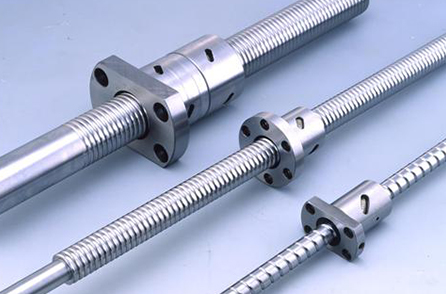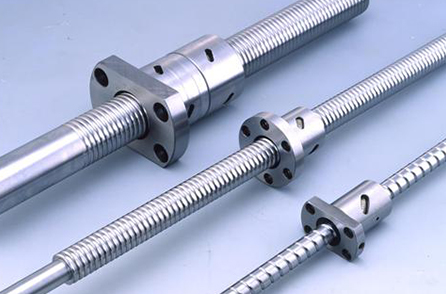絲杠支撐方式解析:從結構特性到應用場景的深度探討
來源:http://www.zsdress.com/ 日期:2025-06-09 發布人:
在機械傳動系統中,絲杠作為將旋轉運動轉化為直線運動的核心部件,其支撐方式直接決定了設備的精度、剛性和使用壽命。根據不同的工況需求,絲杠的支撐方式可分為四種典型類型,每種方式在結構特性、適用場景及優缺點上均有顯著差異。
In mechanical transmission systems, the screw serves as the core component that converts rotational motion into linear motion, and its support method directly determines the accuracy, rigidity, and service life of the equipment. According to different working conditions, the support methods of lead screws can be divided into four typical types, each of which has significant differences in structural characteristics, applicable scenarios, and advantages and disadvantages.
一端固定一端自由:垂直傳動與短行程的優選方案
One end fixed and one end free: the preferred solution for vertical transmission and short stroke
該支撐方式的結構特點為一端采用組合式角接觸軸承進行軸向固定,另一端完全自由。其優勢在于結構簡單、安裝成本低,尤其適用于短行程或垂直布置的絲杠。例如,在數控機床的垂直坐標軸或升降臺中,這種支撐方式可通過絲杠及負載的自重使其處于拉伸狀態,從而補償因自重引起的彎曲變形。然而,其局限性也十分明顯:軸向剛度與臨界轉速較低,絲杠穩定性較差,因此僅適用于低轉速、中精度的場景。若絲杠長度較長或轉速要求較高,則需謹慎選擇此方式。
The structural feature of this support method is that one end is fixed axially with a combined angular contact bearing, and the other end is completely free. Its advantages lie in its simple structure and low installation cost, especially suitable for short stroke or vertically arranged lead screws. For example, in the vertical coordinate axis or lifting platform of a CNC machine tool, this support method can compensate for bending deformation caused by the weight of the screw and load by keeping it in a stretched state. However, its limitations are also very obvious: the axial stiffness and critical speed are low, and the stability of the screw is poor, so it is only suitable for low-speed, medium precision scenarios. If the length of the screw is long or the speed requirement is high, this method should be carefully selected.
一端固定一端支撐:中等精度與速度的平衡之選
Fixed at one end and supported at the other: a balanced choice between medium precision and speed
作為常用的安裝方式,該結構一端通過組合式角接觸軸承實現軸向固定,另一端采用深溝球軸承提供徑向支撐。其核心優勢在于兼顧了剛性與安裝便利性——固定端可同時承受軸向力和徑向力,支撐端則通過微量軸向浮動減少絲杠熱變形的影響。這種設計使其廣泛應用于中等速度、精度要求較高的場合,如普通數控機床的進給系統。不過,支撐端的剛性相對較弱,在高精度需求下可能需輔助以預拉伸或溫控措施。
As the most commonly used installation method, one end of the structure is fixed axially through a combined angular contact bearing, and the other end is supported radially by a deep groove ball bearing. Its core advantage lies in balancing rigidity and installation convenience - the fixed end can withstand both axial and radial forces simultaneously, while the support end reduces the impact of screw thermal deformation through a small amount of axial floating. This design makes it widely used in applications with medium speed and high precision requirements, such as the feed system of ordinary CNC machine tools. However, the rigidity of the supporting end is relatively weak, and auxiliary measures such as pre stretching or temperature control may be required for high-precision requirements.

兩端支撐:低成本與靈活性的妥協方案
Two end support: a compromise solution between low cost and flexibility
兩端均采用深溝球軸承的支撐方式,結構簡單且成本較低,但軸向剛性顯著低于其他類型。由于兩端制徑向自由度,絲杠的熱膨脹會直接影響傳動精度,因此多用于對剛性要求不高的中等速度場景。典型應用包括手動調整機構或低負荷的自動化設備。盡管其應用范圍有限,但在空間受限或預算緊張的項目中仍具實用價值。
Both ends are supported by deep groove ball bearings, which have a simple structure and low cost, but their axial rigidity is significantly lower than other types. Due to the limitation of only radial degrees of freedom at both ends, the thermal expansion of the screw directly affects the transmission accuracy, making it more commonly used in medium speed scenarios with low rigidity requirements. Typical applications include manually adjusting mechanisms or low load automation equipment. Although its application scope is limited, it still has practical value in projects with limited space or tight budgets.
兩端固定:高速高精場景的剛性保障
Fixed at both ends: rigid guarantee for high-speed and high-precision scenes
通過兩端組合式角接觸軸承的軸向固定,該方式可承受極高的軸向載荷,軸向剛度較“一端固定一端支撐”提升約4倍。其特點在于對絲杠施加預拉伸,以抵消高速運轉時摩擦生熱導致的熱變形,從而確保長期精度穩定性。因此,它成為高速機床、精密加工中心等高端設備的方案。然而,復雜的安裝調試流程和對熱變形的敏感性也增加了使用門檻,需配備高精度的預緊力控制與溫度補償系統。
By using a combination of two end angular contact bearings for axial fixation, this method can withstand extremely high axial loads, and the axial stiffness is increased by about 4 times compared to "one end fixed and one end supported". Its biggest feature is to apply pre tension to the screw to counteract the thermal deformation caused by frictional heating during high-speed operation, thereby ensuring long-term accuracy stability. Therefore, it has become the preferred solution for high-end equipment such as high-speed machine tools and precision machining centers. However, the complex installation and debugging process and sensitivity to thermal deformation also increase the threshold for use, requiring high-precision preload control and temperature compensation systems.
支撐方式的選擇原則與優化方向
Principles and optimization directions for selecting support methods
在實際工程中,支撐方式的選擇需綜合考量負載特性、轉速要求、行程長度及成本預算。例如,短行程垂直傳動優先選“一端固定一端自由”;中等精度要求的水平進給系統適合“一端固定一端支撐”;而高速、長絲杠場景則必須采用“兩端固定”結構。此外,通過材料升級(如采用角接觸軸承替代深溝球軸承)、表面處理優化(如鍍鎳防腐)以及智能溫控技術的融入,可進一步提升支撐系統的綜合性能。
In practical engineering, the selection of support methods requires comprehensive consideration of load characteristics, speed requirements, stroke length, and cost budget. For example, for short stroke vertical transmission, priority should be given to "one end fixed and one end free"; A horizontal feed system with medium precision requirements is suitable for "one end fixed and one end supported"; In high-speed and long filament scenarios, a "fixed at both ends" structure must be adopted. In addition, by upgrading materials (such as replacing deep groove ball bearings with angular contact bearings), optimizing surface treatment (such as nickel plating for corrosion prevention), and integrating intelligent temperature control technology, the comprehensive performance of the support system can be further improved.
隨著制造業向高精度、率方向發展,絲杠支撐技術正朝著模塊化、智能化方向演進。未來,自適應支撐系統可能通過嵌入式傳感器實時監測絲杠狀態,并自動調整預緊力與補償量,從而徹底顛覆傳統支撐方式的設計范式。
With the development of manufacturing towards high precision and efficiency, screw support technology is evolving towards modularity and intelligence. In the future, adaptive support systems may completely overturn the design paradigm of traditional support methods by real-time monitoring of screw status through embedded sensors and automatically adjusting preload and compensation.
本文由導軌絲杠友情奉獻.更多有關的知識請點擊:http://www.zsdress.com真誠的態度.為您提供為的服務.更多有關的知識我們將會陸續向大家奉獻.敬請期待.
This article is a friendly contribution from the guide screw For more information, please click: http://www.zsdress.com Sincere attitude To provide you with comprehensive services We will gradually contribute more relevant knowledge to everyone Coming soon.
- 上一篇:導軌滑動摩擦怎么降低呢?
- 下一篇:導軌有哪些種類?
 導軌絲杠:從設計結構...<>
導軌絲杠:從設計結構...<> 大型絲杠的性能設計介...<>
大型絲杠的性能設計介...<> 梯形絲杠和滾珠絲杠的...<>
梯形絲杠和滾珠絲杠的...<> 滾珠絲桿目前的行業的...<>
滾珠絲桿目前的行業的...<> 滾珠絲杠螺母油封更換...<>
滾珠絲杠螺母油封更換...<>



